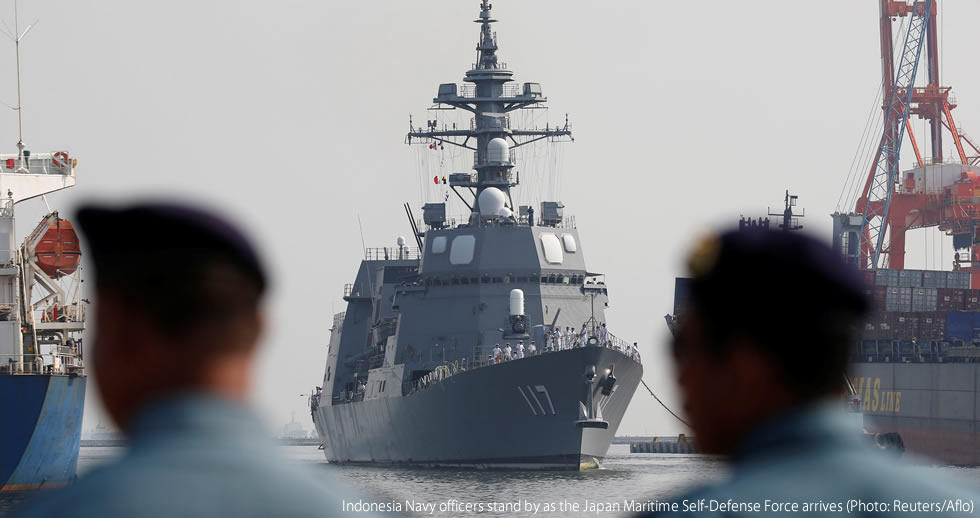No. 287
-
The Japan Maritime Self-Defense Force (JMSDF) has served as a means by which Japan can fulfill its responsibilities in the international community. For example, it sent minesweepers to the Persian Gulf after the Gulf War in 1991, dispatched destroyers, etc., to the Indian Ocean after the terrorist attacks in the United States in 2001, and dispatched naval vessels and aircraft to the Gulf of Aden off Somalia to conduct counter-piracy operations in 2009.
-
In recent years, such activities as the "Indo Southeast Asia Deployment" have been carried out with the clear goals of contributing to regional peace and stability and promoting mutual understanding and greater trust with other countries.
-
This is consistent with the Free and Open Indo-Pacific (FOIP)'s goal "to establish an international order based on the rule of law through comprehensive efforts for promotion and consolidation of fundamental principles, economic prosperity with connectivity and commitment for peace and stability."
After the fall of the Berlin Wall in 1989 and the end of the Cold War, Japan Maritime Self-Defense Force (JMSDF) activities changed drastically. In 1990, when Iraq invaded Kuwait and the Gulf War broke out, Japan offered US$13.5 billion, but the international community responded by saying, "Japan only spends money and never sweats." Japan was still allergic to war, and there was strong opposition to the dispatch of the JMSDF overseas. As a last resort, the Japanese government dispatched minesweepers to the Persian Gulf to remove abandoned mines after the Gulf War. This was the first time since World War II that that JMSDF had been sent overseas to perform duties.
When the terrorist attacks occurred in the United States in September 2001, the Japanese government immediately decided to dispatch JMSDF destroyers to the Indian Ocean, following the precedent established by the dispatch of minesweepers to the Persian Gulf after the end of the Gulf War, which had prompted Japan to contribute to the stability of the post-Cold War international community and to participate in PKO and international emergency relief activities. In 1997, the Japan-US Security Consultative Committee approved the new Guidelines for Japan-US Defense Cooperation and, in 1999, the Act concerning the measures for peace and safety of Japan in situations in areas surrounding Japan, which ensures the Guidelines' effectiveness, came into force. The two countries considered specific measures to be taken jointly not only in the event of an emergency in Japan but also in the event of a situation in areas surrounding Japan, and this led to the formation of a system in which Japan and the United States were to jointly address various post-Cold War situations. The JMSDF dispatch was to provide support in rear areas, not in combat zones, but it was a strong indication that Japan would participate in the fight against terrorism as a member of the international community. In 2007, incidents of piracy off the coast of Somalia in the Gulf of Aden increased rapidly, and damage to Japanese commercial vessels occurred. In 2009, the United Nations Security Council adopted a resolution to prevent piracy, and countries were requested to dispatch warships and military aircraft. As the Gulf of Aden is an extremely important sea lane for Japan, Japan dispatched destroyers in March 2009 to conduct counter-piracy operations. In June, P-3C patrol aircraft also started surveillance flights and, in June 2011, a base for P-3C operations was constructed at an airport in Djibouti. This activity is still ongoing.
Since Japan's proposal of its Free and Open Indo-Pacific (FOIP) vision, JMSDF activities have undergone further changes. First, several JS Izumo-class and other destroyers have been dispatched on extended deployments to the Indo-Pacific region. In 2018, JS Kaga, JS Inazuma and JS Suzutsuki were assigned to the "Indo Southeast Asia Deployment" and carried out their activities with the clear goals of contributing to regional peace and stability and promoting mutual understanding and greater trust with other countries. These activities were conducted in close coordination with the Joint Staff, the National Security Secretariat, the Ministry of Foreign Affairs, etc., and were exactly the actions needed to realize the FOIP vision. In addition, these actions were disclosed to the media as part of the government's strategic communications designed to convey carefully considered messages, and it can be said that JMSDF activities have realized the will of the nation. This deployment is now carried out every year.
The second is information-gathering activity for ensuring the safety of navigation for Japan-related vessels in the Middle East. In February 2020, JS Takanami was dispatched to the Middle East to strengthen intelligence gathering and, since then, destroyers have performed this mission in rotation. This dispatch has seen the JMSDF cooperating with the Ministry of Foreign Affairs and other related organizations to carry out the FOIP concept of "establish[ing] an international order based on the rule of law through comprehensive efforts for promotion and consolidation of fundamental principles, economic prosperity with connectivity and commitment for peace and stability. "
Tokuhiro Ikeda is Director of National Security Institute at Fujitsu System Integration Laboratories Ltd.. He is former Commandant, Kure District /VADM, JMSDF (Ret.).
The views expressed in this piece are the author's own and should not be attributed to The Association of Japanese Institutes of Strategic Studies.



